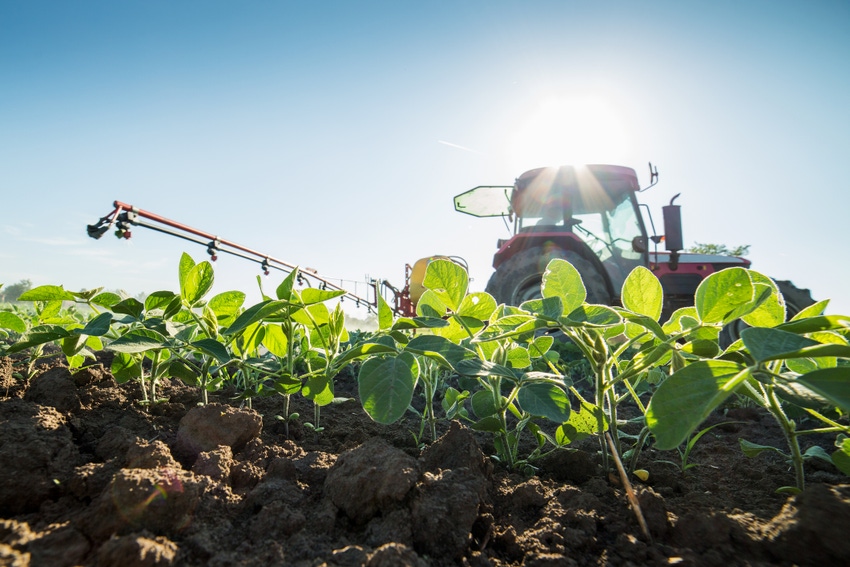
By Justina Vasquez
A newly banned herbicide has become a crux for the world’s second-largest soybean producer as U.S. farmers struggle with not knowing if they’ll regain access to the long-trusted weed killer for next year’s crop.
The U.S. government banned dicamba earlier this year, though there are prospects of a reprieve. The U.S. Environmental Protection Agency is expected to announce this month if dicamba-based products can be used next planting season, Administrator Andrew Wheeler said in an Oct. 1 webinar with the Minnesota Farm Bureau. Those products include soybean seeds resistant to the weed killer and the herbicide itself, under brands including BASF SE’s Engenia and Bayer AG’s Xtend.
“We haven’t had this situation we have this year where there’s this uncertainty on whether or not they’re going to be able to apply dicamba over the top of soybean crops,” Michael Frank, who heads Nutrien Ltd.’s Ag Solutions business, said in a phone interview. “It’s creating anticipation to see what EPA is going to do.”
U.S. crop farmers are in the middle of harvest, gathering information on yields and whether herbicides proved effective for soybean growth in the U.S., whose output is second only to Brazil. It’s also when they start deciding which agricultural chemicals to bet on for next season, affecting sales in the world’s $60-billion crop-chemical industry -- raising the stakes of the EPA’s decision.
The U.S. Court of Appeals for the Ninth Circuit earlier this year blocked the herbicide, arguing that the EPA ignored risks associated with the chemical drifting onto other properties and violated federal regulations when it extended licensing in October 2018 for two years. The agency criticized and later undercut the court decision, which has canceled registration for three dicamba-based products sold by BASF, Bayer and Corteva Inc.
U.S. farmers will harvest 82.3 million acres of soybeans for the 2020-2021 crop year, according to the U.S. Department of Agriculture estimates. USDA data show 94% of soybeans planted in the U.S. in 2020 are genetically modified specifically to tolerate herbicides.
The American Farm Bureau Association and other industry groups advocated for continued dicamba use, arguing that most crop farmers are already familiar with it and switching to other products could jeopardize yields. Others take issue with the chemical’s level of so-called volatility, a key factor for whether it could vaporize or run off into soils that don’t have resistance to it, potentially damaging other crops or causing other harmful effects.
For crop-chemical makers, their brands are on the line: if dicamba gets pulled, it could mean discounting products, managing supply of alternatives and potentially stricter regulation on herbicides that are already approved.
Farmers unwilling to risk buying dicamba on fears it’ll get banned may mull alternatives including 2,4-D, the active ingredient in Corteva’s Enlist line of herbicides. It’s among the most commonly used products and, like dicamba, is often grouped with two other chemicals -- glysophate and glufosinate -- to protect seeds from a greater variety of weeds.
Growers would see 2,4-D as a viable substitute since it proved comparably effective against dozens of tough weeds, Morningstar analyst Seth Goldstein said in an interview. That may help Corteva, even if dicamba ultimately gets approved.
“The longer the EPA waits to make the decision, the more likely it is in my view that farmers switch anyway just due to the uncertainty,” he said. “I think farmers would rather have the certainty of a product even if they haven’t used it before.”
Corteva expects industry demand for its Enlist E3 soybean seeds, which are resistant to 2,4-D choline, glyphosate and glufosinate, will climb to more than 30% in 2021, according to company spokesman Gregg Schmidt. That follows this year’s projected 20% share of planted soybean acreage.
Nutrien’s Frank said he sees sales of Enlist soybeans increasing in 2021, though if the ban ends next year’s bestsellers will likely be Bayer’s Xtend line of products.
One chemical-resistant seed by Bayer, XtendFlex, already received final approval in September for use next year in the U.S. and Canada. The product allows tolerance to both dicamba and glufosinate, a chemical that has become popular in recent decades because of its effectiveness against newer strains of weeds that developed with the rise of genetically modified seeds. Bayer expects XtendFlex to cover 20 million soybean acres next year.
If the EPA rules against dicamba, Bayer plans to compensate farmers who bought its dicamba products, including as much as $7 off each unit of some soybean seeds and $40 off each unit of certain cotton seeds resistant to the herbicide. Bayer is willing to make such provisions despite being “very confident” on future prospects of its dicamba-based XtendiMax, product manager Alex Zenteno said in an interview.
“We’re willing to put a program down to help growers get that confidence if they’re feeling uncertain or unsure, or considering other options,” she said.
© 2020 Bloomberg L.P.
About the Author(s)
You May Also Like




